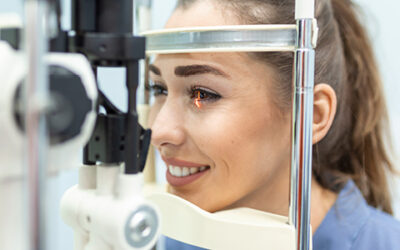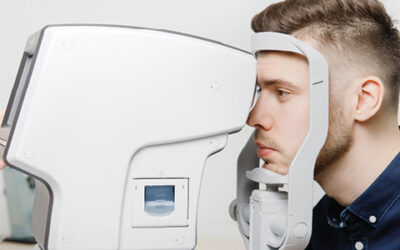- If you’ve ever needed to see an eye doctor with concerns about your eyes, whether that’s to do with your vision, dry or droopy eyes, conjunctivitis, or something else, you may have noticed that there are two main types of eye specialists: optometrists and ophthalmologists.
- As this is a common question we get asked when clients are booking appointments with our team, today we’ve taken a closer look at the difference between optometrists and ophthalmologists, including exploring their qualifications, scope of practice and services that they provide. Your eyesight is important, so let’s see how you can choose the best eye-care professional, whatever your needs.
Optometrists vs. Ophthalmologists – What’s The Difference?
- Put simply, an optometrist is your primary health care provider for routine eye care, while an ophthalmologist is a secondary or tertiary health provider, meaning they are a medical doctor who specialises in eye surgery and medical interventions. This could be comparable to the difference between seeing a podiatrist or an orthopaedic surgeon (a medical doctor trained in lower limb surgery and medical interventions) when you’re experiencing leg pain and aren’t sure where to start.
Optometrists: Your Primary Health Care Provider
- An optometrist is your primary health care provider for regular and routine eye care.
- Qualifications: Becoming an optometrist usually requires five years of specialised university training, typically a three-year Bachelor’s degree in Vision Science followed by a two-year Master of Optometry qualification. After attaining both of these, you can register with the Optometry Board of Australia and practise as an optometrist in a clinic.
- Scope Of Practice And Services: Optometrists focus on vision care and:
- – Perform comprehensive eye exams and vision tests, including yearly eye exams
- – Prescribe and fit glasses, eyewear, glasses, contact lenses and other visual aids
- – Monitor medical eye conditions related to diseases like diabetes and age-related macular degeneration
- – Diagnose, manage and treat a range of medical eye conditions such as dry eyes, glaucoma, conjunctivitis, retinopathy and more
- – Provide low-vision aids and vision therapy
- – Prescribe medication and treatments for a range of eye conditions
- – Perform medical treatments or minor surgical procedures for different eye conditions
- – Provide post-surgical eye care and eye health education
Ophthalmologist: Medical and Surgical Eye Specialist
- An ophthalmologist, known as an eye surgeon, is a secondary or tertiary health provider. They provide the next level of care and specialise in eye surgery and more complex medical interventions. Despite specialising in the eyes, they generally do not offer the same base services as optometrists, instead working with more complex conditions that require surgery or a specialised approach.
- Qualifications: In total, an ophthalmologist will have a minimum of 13 years of university education, though many have more, especially if they then pursue a further subspecialty of eye health and surgery. This timeframe includes completing medical school, internships, residency and vocational training, earning them the title of an ophthalmologist. Many newly-qualified ophthalmologists will also follow their vocational training with a year or two of fellowship training in their chosen subspecialty area, which equips them with experience managing more complex or specific conditions such as cataracts, paediatrics eye care (babies and children), and medical or surgical vitreoretinal diseases, or conditions that affect the retina or the gel-like fluid part of the eye.
- Scope Of Practice And Services: With extensive training for in-depth surgical procedures in diseases of the eyes, this is their specialty, so almost all ophthalmologists will focus on this as their primary scope of care. Along with complete vision and eye care services, they specialise in:
- – Medical eye care for conditions like iritis, chemical burns and glaucoma
- – Surgical intervention for serious or complex diseases and concerns such as strabismus, cataracts, corneal transplants, trauma, crossed eyes, and retinal detachment
- – Laser eye surgery
- – Plastic surgery, including blepharoplasty to raise droopy eyelids or other procedures to smooth out wrinkles
- – Many ophthalmologists are also involved in scientific research investigating different eye diseases and vision disorders.
FAQ
- Should I see an optometrist or ophthalmologist if I’m worried about my eyesight?
- If you have concerns about your eyes or vision, the first step is always to make an appointment to see your local optometrist, who can assess your eye health and visual acuity with a comprehensive eye exam. From there, optometrists can manage a wide range of eye and vision concerns and refer you to a recommended ophthalmologist to address serious eye concerns or findings. The only scenario where you may wish to book in with an ophthalmologist first is if you are already under the care of (or have previously been under the care of) an ophthalmologist who is familiar with your history and medical circumstances has been treating you in the past.
Why choose The Optical Co?
- Eyesight is incredibly important and often something we take for granted until a problem occurs. We wholeheartedly understand how important your eyesight is and have frames and lenses that suit your face shape and personality. Ensuring every part of your care best suits you is of utmost importance to us. Other reasons why people choose our leading clinics to include:
- – Our focus on prevention
- With up to 90% of all vision loss being preventable, we strongly believe in taking a preventative and proactive approach to each person’s eye care, utilising early detection techniques and technology to help protect and promote vision and overall eye health. We know how important your eyesight and eye health are for your overall well-being and your ability to stay independent and enjoy doing the things you love.
- There are many eye diseases that have few or no early symptoms, and they can develop at any age. This is why we recommend having regular eye health checks with a team of experienced optometrists, who use their comprehensive knowledge paired with digital tools to help track subtle changes in your eyes over time, and pick up on any concerns as soon as they arise, so you can start your treatment and management plan as soon as possible.
- – Our innovative equipment and advanced specialist services
- We offer specialised vision testing alongside advanced treatment options and preventative strategies. Our optometrists can fit you with uniquely tailored prescription lenses, frames and contact lenses to best correct your eyesight and suit your vision needs, your lifestyle, and your preferred aesthetics, including designer eyewear with many leading international and independent brands. Consultations for contact lenses or for people with specific health requirements can also be easily arranged.
- As well to our comprehensive eye exams, we offer a variety of specialist services using modern equipment for maximum comfort, including Retinal Photography and Optical Coherence Tomography, which can help identify a range of eye diseases in their early stages, including:
- – Diabetic changes or retinopathy
- – Glaucoma
- – Age-related macular degeneration
- – Retinal vascular changes
- – Retinal detachment
- We also offer targeted care for a wide range of eye conditions, whether you suffer from dry eyes, colour impairment, eye strain, or a medical condition such as diabetes, high blood pressure or glaucoma. Every treatment plan is designed uniquely for your needs and preferences to help optimise your quality of life.
- – Our friendly, experienced and highly-qualified staff
- Beyond our innovative equipment and evidence-based optometry care, we have a world-class team of passionate and dedicated eye health practitioners that understand that everyone has different preferences and priorities for their glasses and optical care, and so work closely with you to help you stay comfortable and confident at every step of the journey.
- Our qualified eye care professionals are dedicated to helping you get the most out of your eyesight, going above and beyond for your care, supporting you at every step, and ensuring you feel comfortable, listened to, and informed.
- – Our flexible payment options
- We offer bulk-billed comprehensive eye exams (subject to Medicare eligibility) and work extensively alongside the DVA, NDIS and health funds.
To explore our range of expert professional services across our wide range of optometry services, explore our website, or book your appointment, contact one of your local clinics here.




